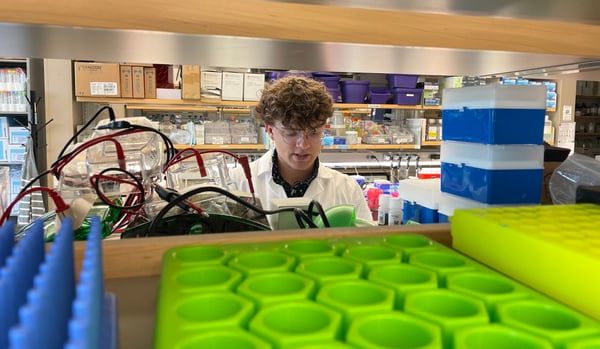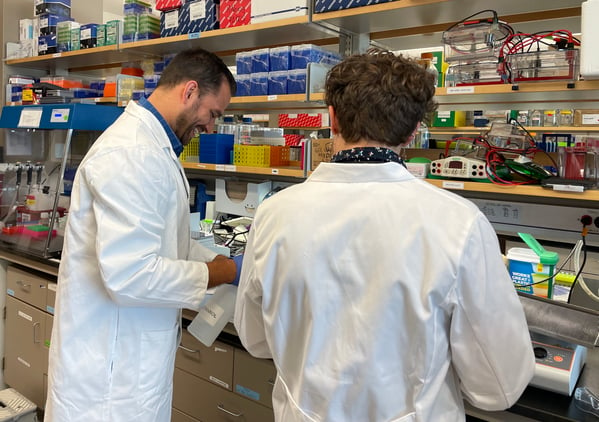Growing up in Windsor, Colorado, Elijah Johnson thought he would grow up to be a professional musician. He never considered a career as a biomedical researcher. But that all changed when his mother was diagnosed with Li-Fraumeni Syndrome (LFS), a rare genetic mutation that increases the risk of cancer.
“My mother had three cancers before the age of 40, which made the physicians suspicious,” says Johnson, now a junior at Colorado Christian University (CCU) in Lakewood. “They had tested her a few years prior to that for any genetic abnormalities, but her mutation was missed back then, partially because they didn’t have the technology they have now. They tested her again after her third cancer, and they found the mutation in her gene.”
Since LFS is genetically inherited, Johnson and his three brothers were tested for the condition as well. He and his younger brother were both positive for LFS, a rare mutation in a tumor suppressor gene called TP53. The mutation makes the body less able to stop cancers from growing and spreading, increasing the risk that those who have it will develop cancer. According to the Li-Fraumeni Syndrome Association, people with LFS have a 90% chance of developing at least one type of cancer in their lifetime, and a 50% chance of developing a cancer before age 30.
For Johnson, his brother, and hundreds of others like them, that means increased surveillance and screenings for cancers that are much more likely to develop.
“It’s a bit of a waiting game, and we have to do a lot of screening and preventative measures in order to catch it early,” Johnson says. “Quarterly, we do abdominal ultrasounds, bloodwork, and physical checkups with an oncologist, and I will start doing biannual colonoscopies at 25. None of it is over the top, but every few months we do something.”
Introduction to medical research
Partially in response to his LFS diagnosis, Johnson entered CCU as an aspiring physician. But his work in a research lab at the university shifted his focus to medical research and the chance to help others with LFS. In 2022, through the University of Colorado Cancer Center’s Cancer Research Experience for Undergraduates (CREU) program, he began conducting research in the lab of CU Cancer Center member Matt Witkowski, PhD.
“I entered school wanting to become a physician. And then during my first semester, I conducted biomedical research with a professor here at CCU, and I fell in love with it,” Johnson says. “That professor let me know about the CREU program, which is a paid internship that lets you experience research at a big academic institution. I was just a freshman, and I didn't have much experience, but I decided to give it a shot.”
 Johnson works in Witkowski's lab.
Johnson works in Witkowski's lab.
A new arrival to the CU Cancer Center at the time, Witkowski wasn’t planning to take on a student researcher until he read Johnson’s application.
“He had such a personal story that I thought, ‘I’m going to take him. He really wants to do this,’” remembers Witkowski, assistant professor of pediatrics. “To see someone who lives with this condition apply for this position was really inspiring. There was so much passion in his essay and application, and he really wants to make a difference for people who have this syndrome. I decided to bring him in because he’s trying to do something for people like himself.”
Meaningful research
Johnson worked in Witkowski’s lab from June 2022 to February 2023. Witkowski developed a project connected to LFS, looking to create an animal model of acute lymphoblastic leukemia, a blood cancer impacted by the TP53 gene. It was exciting, Johnson says, to work on a project that had such a personal connection.
“It confirmed my passion for research,” he says. “It showed me that it’s possible to do research in the area that I’d like to, and that I could have a positive effect on the field and on patients’ lives one day.”
For his part, Witkowski says, the project he created in response to Johnson’s LFS set him on a new research path.
“It changed the way I look at my future as a scientist in many ways,” Witkowski says. “This is one of the biggest problems in cancer. In my PhD and my postdoc, whenever you thought about TP53, it’s like looking at Mount Everest. We may never get to the top of it. That’s one thing I’ve accepted now. But at least we can make a few dents and learn a little bit more about it. It’s become very exciting to me.”
Bright future
Johnson worked on another CREU project in summer 2023, this one in the lab of Daniel LaBarbera, PhD, assistant professor in the Skaggs School of Pharmacy and Pharmaceutical Sciences. Both experiences on the CU Anschutz Medical Campus solidified Johnson’s interest in biomedical research; he is now looking into MD-PhD programs he can apply to after he graduates from CCU.
Witkowski has no doubt his former protégé will succeed.
“Anyone that motivated and curious does well in this job,” Witkowski says. “Elijah has this drive that a lot of people would probably shy away from in his situation — he has to face the reality of constant scanning for cancers and things that most people his age don’t have to think about. His determination, his intelligence, and his work ethic are all clear. I can’t wait to watch him grow and become an exceptional scientist. I’m just happy I got to be there for a bit of it.”
 Witkowski and Johnson work together.
Witkowski and Johnson work together.
Johnson says working with Witkowski and LaBarbera, and conducting research that may help others with LFS, is part of his drive to try new things and experience as much as he can of life while he is able to.
“I think I have a bit of a different perspective than other people my age,” he says. “I see the value in every little thing, every experience and every privilege that I have. I try to live with a little more positivity, knowing that my days might not be as long as everyone else’s. I want to appreciate every moment that I have.”



